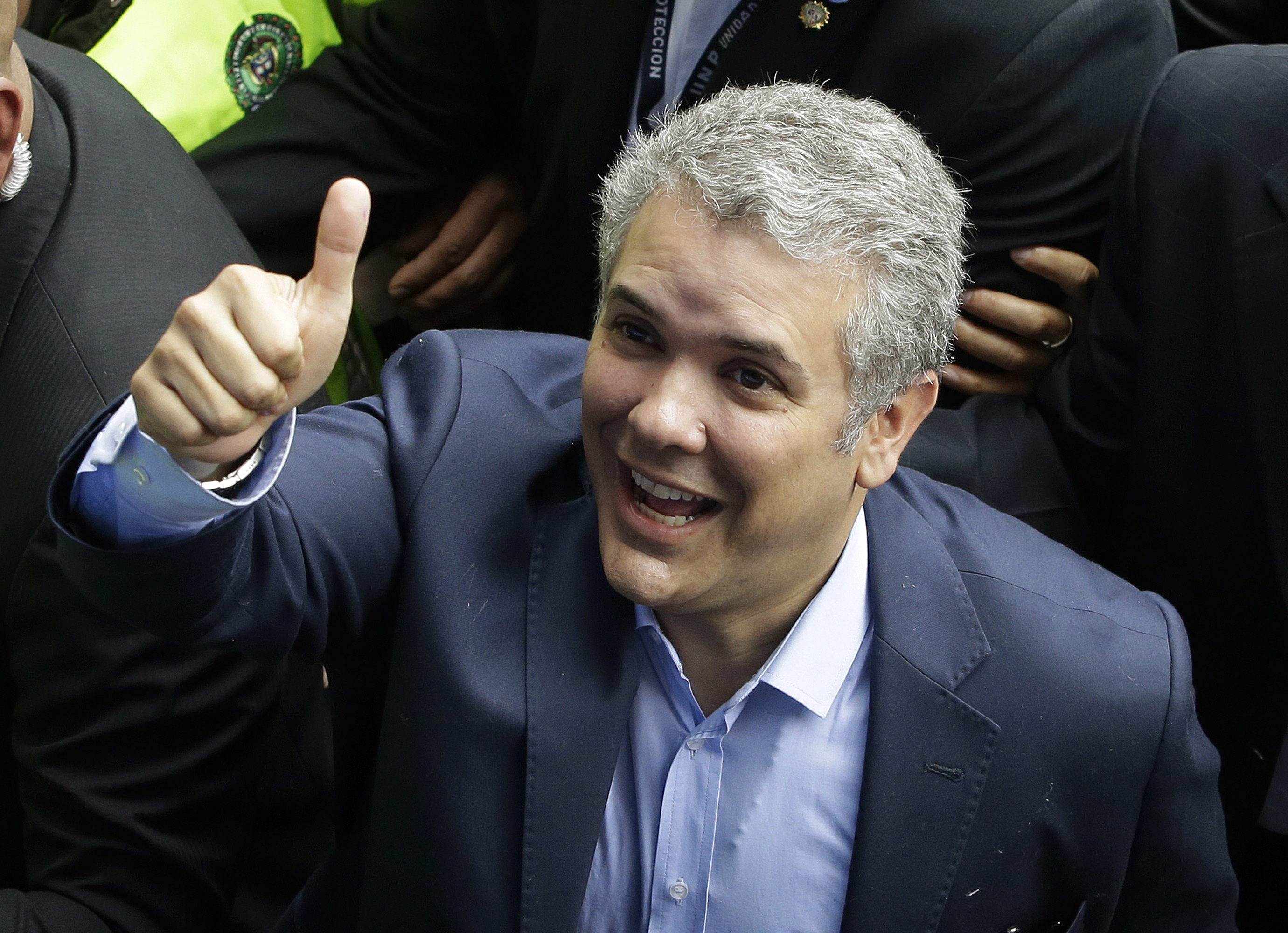
By CHRISTINE ARMARIO
JOSHUA GOODMAN
Associated Press
BOGOTA, Colombia (AP) — Results for Colombia’s first presidential election since the signing of an historic peace accord were trickling in Sunday following a contentious campaign in which voters no longer focused on defeating leftist rebels weighed issues corruption, inequality and crime. Preliminary tallies with 85 percent of polling stations reporting put former senator Ivan Duque in first place with about 39.7 percent of the vote. The race for second place was tight between leftist Gustavo Petro and former Medellin mayor Sergio Fajardo.
Conservative Duque, the protégé of President Alvaro Uribe, the chief critic of the peace deal, has led polls throughout the campaign and is promising to amend important aspects of the accord like ensuring that drug trafficking is not an amnestied crime. Petro had led the race for a spot in a June run-off if Duque is unable to secure the more than 50 percent of votes required to win in the first round. His anti-establishment message has galvanized youth voters upset over corruption and income inequality. Critics have warned the former guerrilla and ex-Bogota mayor’s rise could push Colombia dangerously toward the left.
Long lines of voters gathered in Bogota outside polling centers on an overcast day and police frisked people in at least one site — a legacy perhaps of when voting centers were targeted by leftist rebels who considered the political system a sham. Among the early voters was Rodrigo Londono, the former leader of the demobilized Revolutionary Armed Forces of Colombia, whose ex-combatants have formed a new political party. They put forward Londono as their presidential candidate, but he dropped out after experiencing heart issues.
He said it was his first time voting in a presidential election. “It’s very moving because this is the fruit of a path that Colombians are building,” he said. The election has sparked fears on both the left and right of Colombia’s political spectrum, with Duque’s critics cautioning that his presidency would be tantamount to a constitutionally barred third term for Uribe. Though hugely popular among Colombians for improving security and weakening illegal armed groups, Uribe also presided over grave human rights violations by the military.
Meanwhile, Petro and his populist platform have drawn comparisons from critics to the late Venezuelan socialist leader Hugo Chavez, who Petro once admired. He brought Chavez to Colombia in 1994 shortly after the Venezuelan paratrooper was released from jail, where he was sent for staging a military coup. Petro describes himself as a “strong adversary” of the neighboring country’s current president, Nicolas Maduro, but his early ties to Chavez have dogged him throughout the campaign.
Wanda Rincon, 25, said she had been leaning toward Petro until a few weeks ago. She likes his policies on the environment and support for the peace process but said that she was turned off by his polarizing rhetoric and decided to support Fajardo instead. Fajardo has been credited with transforming Medellin from a hotbed of crime into a growing tourist destination. “They all have good proposals, but it’s a question of character and having the experience to implement them,” she said.
Petro proposes overhauling Colombia’s economic model to free it from dependence on oil exports and instead boost agricultural production through land reform. His campaign says he’d dramatically increase taxes on unproductive lands to encourage landholders to sell them to the state. His platform has resonated in particular with young voters at a time when corruption scandals have embroiled many of the nation’s elected officials. “For years, the only thing the right has caused us is problems,” said Johana Contreras, 29, a flight attendant. “We hope Petro can show us the way.”
In the final days before the vote, Petro accused officials of failing to address a voting software glitch that he said could lead to fraud. He reiterated those concerns Sunday after casting his vote, urging citizens to document any irregularities with their cellphones. His warning of fraud led to an outcry among his competitors and a rare intrusion in the campaign from outgoing President Juan Manuel Santos, who said earlier in the week that “leftist extremists are the same as right-wing extremists: They invent frauds where they don’t exist.”
Aside from the economy, Petro and Duque differ on the peace accord, which has been slow to be implemented and remains controversial among many Colombians who believe it granted overly generous terms to demobilized guerrillas. Petro supports the accord while Duque has said it needs “correcting.” ”If he wins, he has an opportunity to bridge some of these divides in Colombia,” said Michael Shifter, president of the Inter-American Dialogue, referring to Duque. “But the big unknown is what Uribe’s role will be.”
With Colombia’s political polls notoriously unreliable, there’s still room for an upset with candidates like Fajardo and former Vice President German Vargas Lleras trailing close behind. Vargas Lleras is pledging to take a tough stance on remaining security challenges and create more than 1 million new jobs. Three generations of the Rodriguez family said they all voted for Duque because they believe he can provide the stability Colombia needs to leap forward in its development. “People have always been apathetic,” said Jaime Rodriguez while enjoying a typical Bogota brunch of hot chocolate and pork-filled tamales in the company of his 90-year-old mother and his 29-year-old son. “I hope that with the arrival of peace, people will vote en masse.”



















